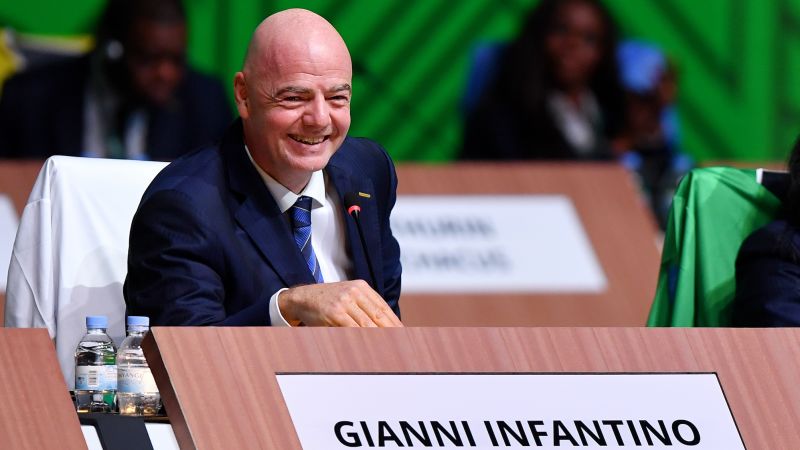CNN
—
Re-elected unopposed for a second term ending in 2027 at FIFA’s 73rd Congress in Kigali, Rwanda on Thursday, the organization’s president Gianni Infantino shared how a visit to the Rwandan genocide memorial inspired him not to give up on his 2016 election campaign.
The 52-year-old lawyer, who succeeded the disgraced Sepp Blatter in 2016, recounted how on his second visit to Rwanda seven years ago, he was told by an unnamed person: “Well we all love you, but actually we’re not going to support you in the election,” as Infantino campaigned to replace his Swiss compatriot.
“And then I decided, I thought about it, and I remembered my visit to the [genocide] memorial – and you should all visit it – and I said ‘Who am I to give up?’
“What this country has suffered, and how this country came back up for the entire world, dear President [Paul Kagame]. So, I certainly couldn’t give up because somebody was telling me something,” Infantino said.
Infantino added that he had stayed in Rwanda to watch the 2016 African Nations Championship final courtesy of a ticket, provided by Kagame.
“I stayed, I attended the match, I continued to campaign, I was elected FIFA president a few months later,” said Infantino.
“But most importantly I witnessed how this country flourished. And this country flourished with nothing, starting from nothing, with hope, with compassion, with commitment, with hard work and with leadership.”
For decades, Kagame has ruled Rwanda with an iron fist in the mold of the archetypal strongman African leader.
Under his rule, the East African country has emerged from the ruins of a devastating 1994 genocide that left nearly one million people dead to be hailed by Western allies as the model for growth in Africa.
However, critics say the successes of Kagame’s authoritarian rule have come at the expense of human rights in the country.
Explosive monologue
Last year, Infantino’s tirade against Western critics of the controversial World Cup in Qatar made headlines around the world, with human rights groups describing it as “crass” and an “insult” to migrant workers.
The tournament was the first World Cup to be held in the Middle East, but was also mired in controversy, with much of the build-up focusing on human rights, from the death of migrant workers and the conditions many have endured in Qatar, to LGBTQ and women’s rights.
“Today I feel Qatari. Today I feel Arab. Today I feel African. Today I feel gay. Today I feel disabled. Today I feel a migrant worker,” he said in an explosive hour-long monologue in front of a stunned audience,” said Infantino.
“I feel this, all this, because what I’ve been seeing and what I’ve been told, since I don’t read, otherwise I would be depressed I think.
“What I’ve seen brings me back to my personal story. I am a son of migrant workers. My parents were working very very hard in difficult situations.”
As Infantino addressed hundreds of journalists in Doha, Qatar, ahead of the tournament, he accused Western critics of hypocrisy and racism.
“We are taught many lessons from Europeans, from the Western world,” he said, referring to criticisms of Qatar’s human rights record.
“What we Europeans have been doing for the last 3,000 years, we should be apologizing for the next 3,000 years before starting to give moral lessons,” he said.
‘Record revenues’ promised
FIFA considers this to be Infantino’s second term after the Swiss stated in December that his first three years in the role did not count as a full term. He will therefore be available to stand for a third and final term in four years’ time.
In his acceptance speech, Infantino thanked his family, team and member associations, saying “All those who love me, I know there are so many, and those who hate me, I know there are few, I love you all, of course today especially.
“Being a president of FIFA is an incredible honor and it is an incredible privilege as well and it is also a great responsibility.
“I am truly humbled and touched by your support and I simply promise you, I will continue serving FIFA, serving football all over the world, serving all 211 member associations of FIFA,” Infantino said.
“Leadership is obviously about listening and learning, and you always learn and I think I am learning every day. And then leadership is also about acting, and I am certainly there to act.
“You can continue to trust on my commitment and the only thing I am asking you is for this my second term to continue working hard together to unite the world with football,” he added.
Earlier during his presidential address Infantino confirmed FIFA’s income hit record levels in the last cycle from 2019-22, but promised to substantially raise this again on the back of expanded men’s and women’s World Cup tournaments and the introduction of a 32-team Club World Cup.
The men’s World Cup will increase from 32 teams to 48 for the next edition in North America in 2026, while the women’s World Cup will feature 32 teams for the first time in Australia and New Zealand later this year.
“Revenues rose to a record $7.5 billion (to 2022) in a period that was hit by Covid-19. When I arrived, FIFA reserves stood at around $1 billion, today they are at almost $4 billion,” Infantino said.
“We promise new record revenues for the next cycle of $11 billion, and the new Club World Cup is not included in that figure, so it could increase by a couple of billion (more).”
CNN’s Ben Church and Nimi Princewill contributed reporting.





